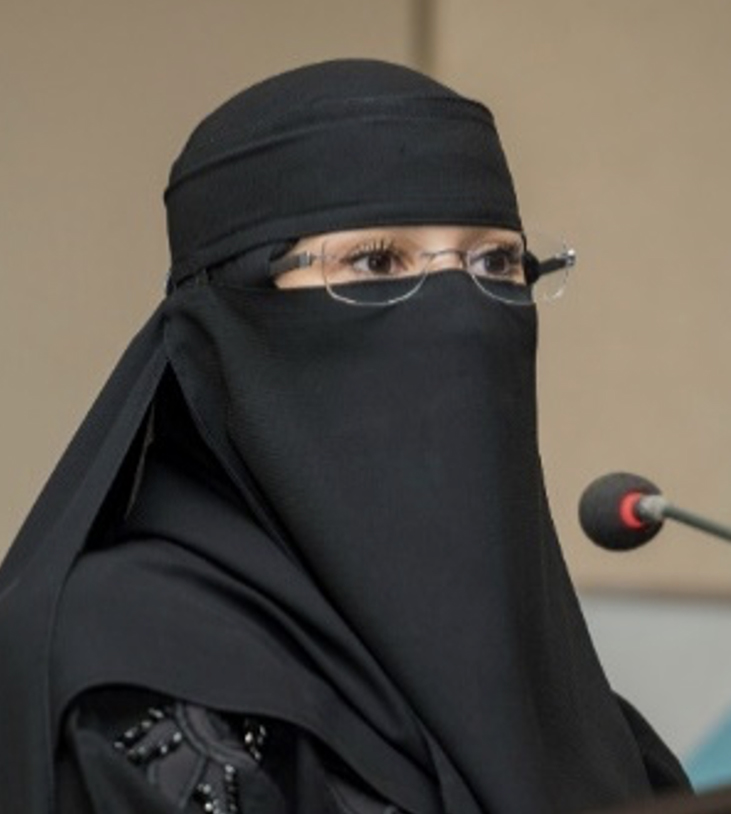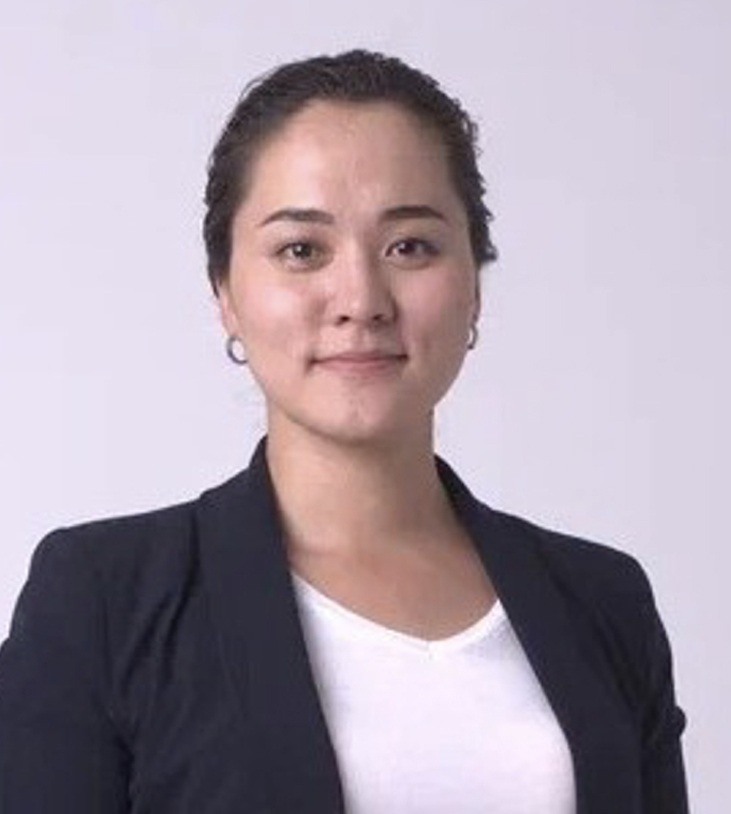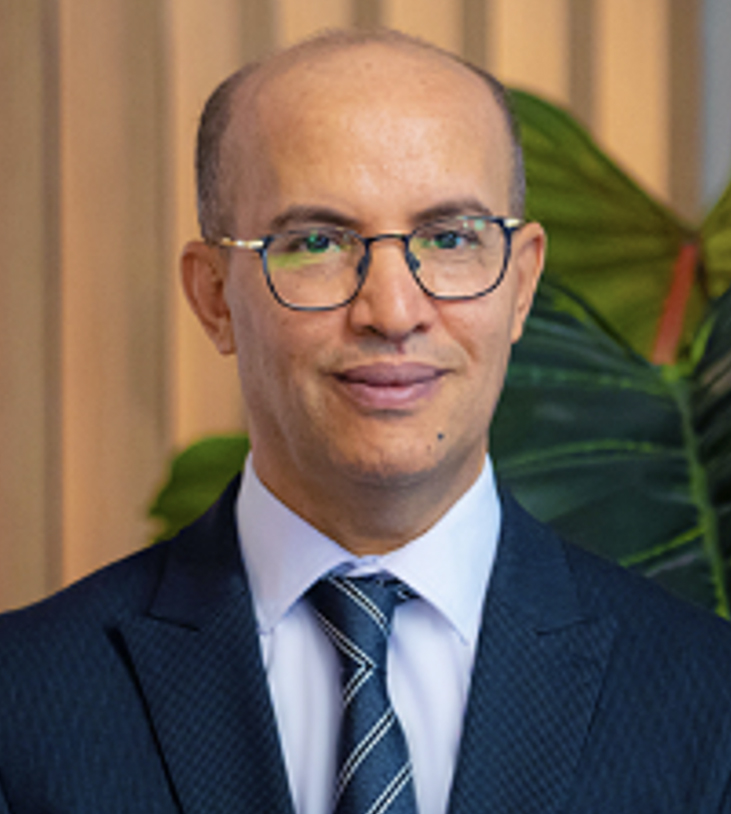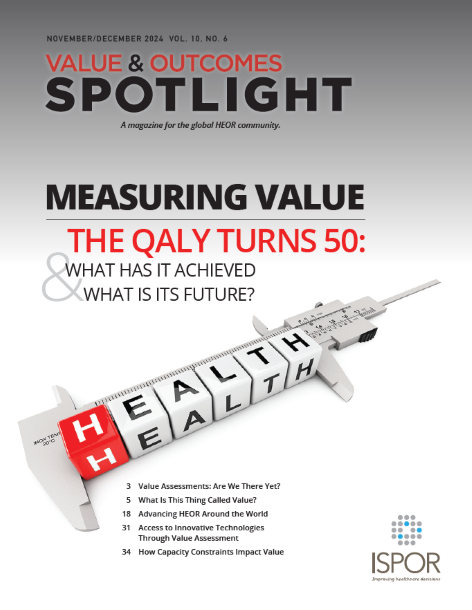Advancing HEOR Around the World: Insights From the Saudia Arabia, Maghreb, and Kazakhstan Chapters
The ISPOR Outstanding Chapter Award program recognizes ISPOR regional chapters’ outstanding contribution and leadership in advancing ISPOR’s mission in global regions: Asia Pacific, Latin America, and Europe, Middle East, and Africa. The ISPOR Saudia Arabia, Kazakhstan, and Maghreb chapters have been recognized for their exemplary achievements in advancing health economics and outcomes research (HEOR) in their regions.
These awards are based on a thorough review of chapters’ impact on HEOR and health policy in their regions through activities, including education, research and engagement, and contribution to ISPOR strategic initiatives, as described in their annual reports.
Large-Sized Chapter

Hana Al-Abdulkarim, PharmD
Corporate Director, Policy and Economy Center
Ministry of National Guard Health Affairs
Kingdom of Saudi Arabia
President, ISPOR Saudi Arabia Chapter
ISPOR: Can you share examples of an innovative project or initiative your chapter launched this year that had a significant impact on the HEOR community in your region?
Hana Al-Abdulkarim: This year has been incredibly successful for the Saudi Arabian chapter. We have been fully dedicated to advancing ISPOR’s mission and vision by organizing and hosting a wide range of activities. Locally, we have held several events, inviting experts from the region to speak or attend. Regionally, we have collaborated with the Gulf Health Economics Association and the Arab Health Economics Network on various initiatives, including chairing a workshop entitled, “Strategic Priorities and Collaborative Opportunities in Health Economics for the Gulf Region.” The workshop focused on discussing opportunities and challenges in adopting and implementing health economic evaluations to address the increasing healthcare challenges in the Gulf Cooperation Council Countries, specifically in the United Arab Emirates. Following the workshop, our chapter team developed a manuscript summarizing the discussions, which we plan to publish as a perspective paper.
In addition, we are proud to announce our partnership with the Arab Health Economics Hub, which aims to build capacity among health economists, health policy makers, healthcare professionals, researchers, and economic and development planners in the Arab region. This collaboration also supports the optimization of health systems at both micro and macro levels in alignment with the internationally agreed sustainable development goals of universal health coverage in the region. As part of this partnership, we organized the 1st and 2nd Annual Arab Health Economics Meeting in Cairo, Egypt.
Furthermore, our chapter conducted a closed session on health technology assessment (HTA) with a group of regional and European experts to leverage the European HTA experience. Beyond our local and regional activities, we had the privilege of participating in 2 regional events, including SIPHA on January 23-25, 2024, which was a significant accomplishment for our chapter. Mai Alsaqa’aby, a member of our chapter, served as one of the scientific committee members and developed a session consisting of 4 talks about health economics. Additionally, we organized a regional event entitled “An Introduction to Patient-Reported Outcomes and their Role in HEOR” in collaboration with HEOR experts from Lebanon and Canada. Additionally, the chapter participated in Seha annual conference in Abu Dhabi, where Dr. Yazed spoke about the socioeconomic burden of select rare health conditions, such as spinal muscular atrophy, in Saudi Arabia. The chapter is also participating in the Emirates Health Economics Society where Dr. Yazed will talk about the impact of healthcare privatization on access, quality, and efficiency. Moreover, he will lead a discussion to explore the status of real-world healthcare data generation in the Gulf Cooperating Council countries and this discussion will involve multiple stakeholders representing the 6 Arab Gulf countries.
ISPOR: What collaborative efforts have you led to strengthen the connection between HEOR professionals across different sectors?
HA-A: Medical community outreach: We have established connections with several medical societies, including the Saudi Diabetes and Obesity Society, the Saudi Community Medicine Society, the Saudi Pharmaceutical Society, and the Rare Diseases Society. Additionally, we have re-established the media committee to reach out to the public and promote our activities and events through various social media platforms such as X, LinkedIn, and others. We have also created our own database of contacts for individuals who have attended our events and those holding different positions in the healthcare sector in order to invite them to our events and share information about our workshops via email. Furthermore, we are in the process of signing a memorandum of understanding with the Saudi National Health Institute (SNIH), which is the leading scientific and research funding body for healthcare researchers in Saudi Arabia.
Cross-sector healthcare outreach: This year, our chapter conducted a Cross-Sector Healthcare conference aimed at fostering collaboration among professionals from various sectors, including the insurance sector, the public health authority, the Saudi FDA, the Health Transformation Program, the Saudi Health Council, rare diseases societies, and the National Institute for Health Research. The goal was to raise awareness around HEOR, enhance communication, improve engagement of the chapter members, share best practices, and address common challenges in healthcare.
We host the international healthcare economics forum in collaboration with Alfaisal University every year. In the upcoming meeting we will be delving into the future of healthcare, focusing on technology, artificial intelligence, and digitalization. This year’s keynote session will unveil the recently published ISPOR framework for defining digital health interventions.
Partnerships: We are collaborating with various sectors, including Princess Nora University, the SNIH, the Public Health Authority, and King Saud University College of Pharmacy.
Community outreach: We conducted an awareness campaign for multiple sclerosis to educate the community about the disease. The campaign was held at Dr. Soliman Alhabib Hospital, one of the largest private hospitals in Riyadh. Our initiative included translating scientific articles into Arabic, a crucial step that significantly enhances access to scientific knowledge and directly contributes to improving healthcare outcomes in the community. The Arabic content is disseminated on various media channels in plain, easily understandable language.
ISPOR: How do you envision your chapter’s contributions influencing the future of HEOR in your country or region?
HA-A: I envision our chapter’s contribution to HEOR as a multifaceted approach that significantly influences future healthcare policies and practices in Saudi Arabia.
Our commitment to public health is unwavering, as evidenced by our efforts to raise awareness about HEOR. This initiative empowers individuals and communities to take control of their health, leading to improved health outcomes and reduced long-term healthcare costs.
Supporting future HEOR experts: We are focusing our educational efforts on students and graduates through introductory HEOR workshops, such as building budget impact models and cost-effectiveness models, and critical appraisal of health economic and scientific studies to provide them with the basic skills that can help them in a future career. Additionally, our chapter board members ensure that students are involved in various subcommittees as volunteers to support the chapter’s vision and mission and gain experience in project management within a nonprofit organization, such as the media, logistics, event management, and public relations committees.
Data-driven insights: Our focus on evidence-based decision making is not just a priority, but a cornerstone of our work. By prioritizing local real-world data collection and analysis, we are able to generate valuable insights into population health trends, shaping health policies and resource allocation. This approach should reassure you of the soundness of our decisions and the confidence we have in our work.
Equity in healthcare access: Our society can advocate for equitable access to healthcare services, particularly for underserved patient populations. An important example is the access challenges faced by patients with rare diseases, who are often denied access to expensive orphan drugs. We have been working for the past 2 years on highlighting and addressing this gap through panel sessions that bring all stakeholders to the same table. Later this year, we will have a workshop to discuss access challenges for patients with spinal muscular atrophy. We hope these efforts will help promote policies that ultimately improve overall health outcomes by ensuring that all individuals receive the care they need.
Innovative health solutions: Emphasizing research and development in health technologies and interventions can lead to more cost-effective solutions. By collaborating with academic institutions and private sectors, we can foster innovation that improves patient care and enhances our healthcare system’s economic sustainability. Moreover, we can emphasize innovative concepts that can address affordability and uncertainty concerns, such as managed entry agreements.
Collaboration across sectors: Encouraging partnerships between government, private sectors, and nonprofits can create a more integrated approach to health economics. Collaborative efforts can lead to shared resources and innovative solutions that benefit the healthcare ecosystem.
I truly believe that we have succeeded in making ISPOR Saudi Arabia recognized as the hub for HEOR experts to network and collaborate and for candidates seeking the next step in their career. Through all these efforts, the ISPOR Saudi Chapter can significantly shape the future of health economics in our country, leading to a more efficient, equitable, and sustainable healthcare system.
Medium-Sized Chapter

Alima Almadiyeva, MD, MSPH
Deputy Chair
Salidat Kairbekova National Research Center for Health Development
Nur-Sultan, Kazakhstan
President, ISPOR Kazakhstan Chapter
ISPOR: Can you share examples of an innovative project or initiative your chapter launched this year that had a significant impact on the HEOR community in your region?
Alima Almadiyeva: The board of the Kazakhstan chapter organized many events during this year. However, the most notable included a project, “Time to Reimbursement for Novel Cancer Medicines Approved in 2013-2022 in Kazakhstan,” which revealed exciting results of observation on the decision-making processes during those almost 10 years. We are preparing to publish those results in the coming months.
The second event was a conference with the participation of world-known international experts from the United States and Europe. This global collaboration is a testament to the growing influence of our chapter and the importance of our work not only for healthcare in Kazakhstan but also for the region of Central Asia and Commonwealth of Independent States. Since health systems in post-Soviet countries have undergone drastic changes and still need to be continuously developed, the discussions raised during the conference were more than just beneficial. Due to global challenges and constant uncertainties, low- and middle-income countries like Kazakhstan are in deep need of rational and comprehensive tools, like health technology assessment (HTA) and health economics and outcomes research (HEOR). We also acknowledge that capacity building is a considerable step forward in value-based healthcare. Thus, the conference held in Astana this year brought us together with other prominent experts from various countries.
ISPOR: What collaborative efforts have you led to strengthen the connection between HEOR professionals across different sectors?
AA: The ISPOR chapter in Kazakhstan has members with various backgrounds. Many are opinion leaders, so seminars and webinars are held annually because of the region’s thirst for knowledge. To support our colleagues, we disseminate insights and global trends from the last ISPOR roundtables and conferences, such as patient-centered research, various evidence-based approaches, and value assessment. Colleagues cooperate in the framework of joint activities, including involvement in preparing legislative acts in health.
Collaborating before and during the conference held in Astana was also important. People serving in other sectors of the economy were engaged. We invited specialists from the Ministry of Health, National Committees and Commissions, the Ministry of Justice, the Ministry of Digital Development, the innovations and aerospace industry, patient organizations, health managers, and individuals with backgrounds in health, economics, or related fields. Some professional associations, such as the Association of Clinical Pharmacologists and the Association of International Pharmaceutical Manufacturers, participated in the discussions. Indeed, there is still much work to complete, especially on capacity building and education on HTA and HEOR, which is a way to increase the level of engagement of colleagues from other countries in Central Asia.
ISPOR: How do you envision your chapter’s contributions influencing the future of HEOR in your country or region?
AA: The more people in our region learn about HTA and HEOR, the more HEOR evolves. Further efforts will be focused on research activities. Some topics from health policy and patient-reported outcomes will kick off our schedule of events for the following years. We also prepare to organize our regional conferences annually. These efforts should improve the understanding among stakeholders and improve decision making considerably.
Small-Sized Chapter

Samir Ahid, PhD
Dean, College of Pharmacy
Euromed University of Fez
Fès-Meknès, Morocco
President, ISPOR Maghreb Chapter
ISPOR: Can you share examples of an innovative project or initiative your chapter launched this year that had a significant impact on the HEOR community in your region?
Samir Ahid: This year, the ISPOR Maghreb Chapter—with the collaboration of the Moroccan Society of Health Economics product (SMEPS)—successfully launched 3 significant initiatives that have greatly impacted the HEOR community. First, the 10th National & 3rd African Conference on Pharmacoeconomics and Pharmacoepidemiology, held in Rabat, emphasized the critical role of the patient’s voice in healthcare decision making. The congress brought together experts from 15 countries, fostering dialogue between patients, healthcare professionals, and policy makers to promote patient-centered approaches in health policy.
In January, the 3rd edition of the post-ISPOR Scientific Day covered the latest developments in health economics, policy, and health technology assessment (HTA). This event provided a platform for sharing knowledge on improving healthcare decision making and financing, addressing Africa’s unique health challenges.
Additionally, the ISPOR Maghreb Chapter, with the collaboration of SMEPS and in partnership with Euromed University of Fez and AstraZeneca, launched the HTA Charaka initiative. This groundbreaking partnership aims to elevate Moroccan capabilities in HTA through educational sessions and workshops. The initiative supports Morocco’s healthcare system reform by promoting evidence-based decision making and improving access to innovative treatments for patients. This collaboration brings together the academic expertise of Euromed University, ISPOR Maghreb Chapter, and SMEPS’s research capabilities and AstraZeneca’s leadership in biopharmaceuticals to create a powerful synergy, advancing healthcare in Morocco.
ISPOR: What collaborative efforts have you led to strengthen the connection between HEOR professionals across different sectors?
SA: The ISPOR Maghreb Chapter has been actively fostering collaboration between HEOR professionals across different sectors through strategic partnerships and initiatives that encourage interdisciplinary engagement. By promoting open dialogue between academia, industry, and government, the ISPOR Maghreb Chapter has strengthened networks that support evidence-based decision making in healthcare.
We have facilitated cross-sector collaborations through educational initiatives, workshops, and capacity-building projects that address both the technical and practical aspects of HEOR. These efforts have enabled professionals to share insights, apply innovative methodologies, and work together toward common goals, such as improving healthcare access and outcomes. Additionally, our partnerships with international and local stakeholders have further expanded the exchange of knowledge and resources, fostering a unified approach to tackling the region’s healthcare challenges.
ISPOR: How do you envision your chapter’s contributions influencing the future of HEOR in your country or region?
SA: The ISPOR Maghreb Chapter is dedicated to shaping the future of HEOR by promoting evidence-based decision making and fostering the integration of HEOR into policy and practice. Our efforts aim to build a stronger foundation for evaluating healthcare technologies, improving access to innovative treatments, and optimizing resource allocation in healthcare systems.
Through our educational initiatives and collaborative projects, we are building local expertise in HEOR and equipping professionals with the tools needed to address the evolving healthcare needs of the region. By strengthening connections between academia, industry, and policy makers, we aim to create a sustainable framework for healthcare innovation that benefits both patients and health systems. Ultimately, our contributions will help advance more efficient, patient-centered healthcare that aligns with global best practices and supports long-term system reforms.

